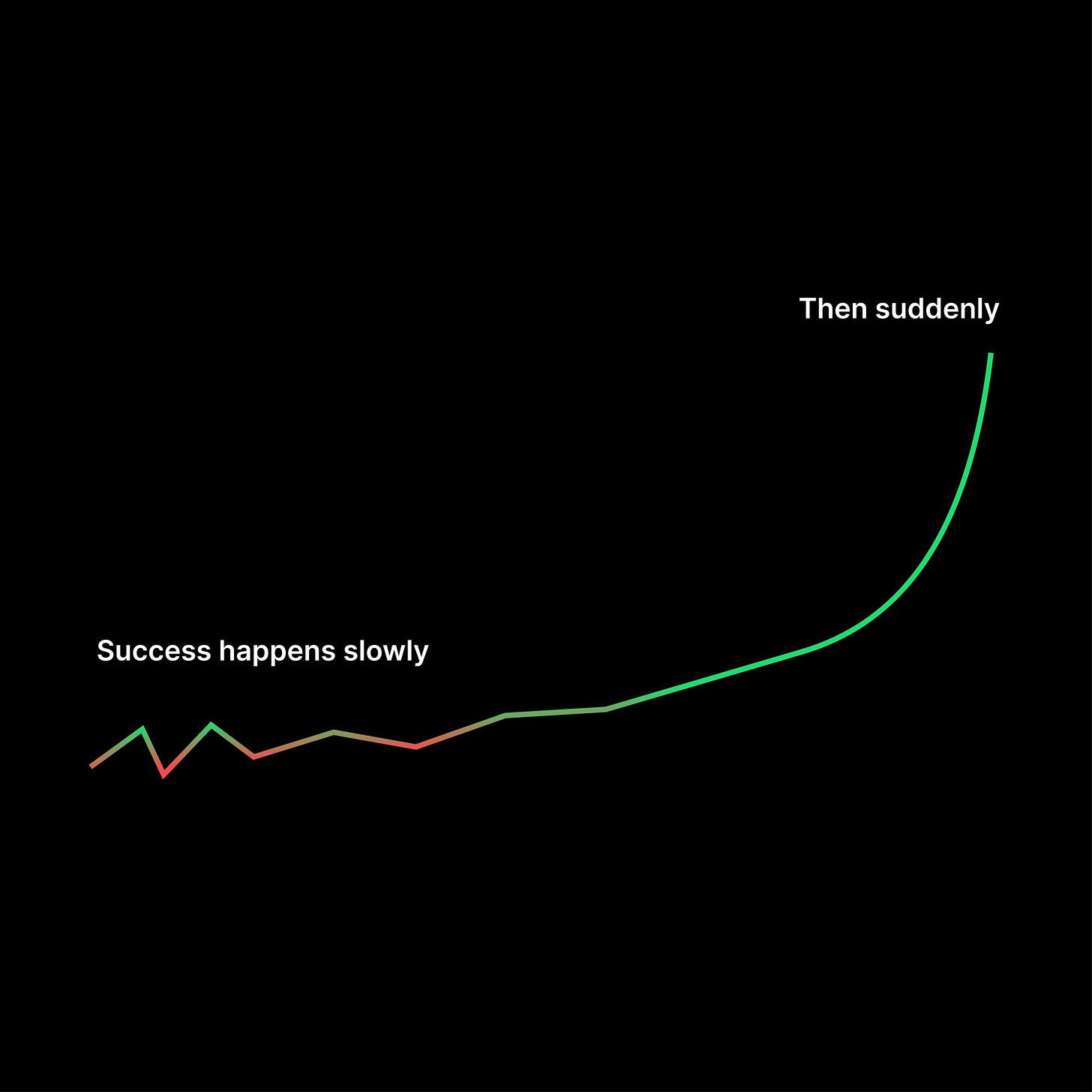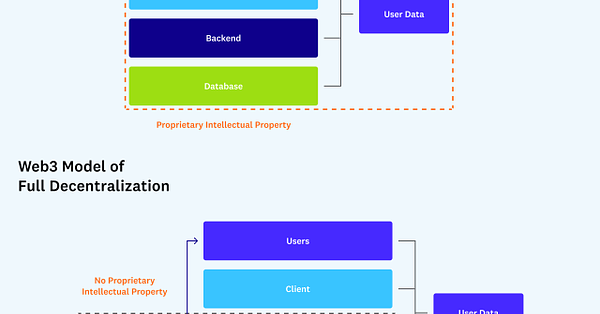In this week’s brew:
The Rule of the Information by Neelendra Nath
Visual Thought of the Week featuring creative by @GoLimitless
Evolution of Decentralization - a twitter thread by Miles Jennings
Today’s post is brought to you by Bookk.me!
For all my independent consulting engagements from product management to startup investment, I am now using Bookk.me to manage my calendar and call bookings. If you would like to book a slot in my calendar you can do it through my link https://bookk.me/neel
Bookk.me is a solution for independent advisors and consultants who can monetize their expertise through just one link, and save themselves the hassle of maintaining calendars, payment gateways etc. You can try out it out here.
POST
The Rule of the Information
Information is much like sugar. We evolved in a world where sugar was scarce source of energy, so we instinctively started loving it. But once we learnt how to mass produce sugar, our love turned in to diabetes. Similarly, we evolved to be curious through the times of information scarcity and now in the era where information is being mass produced and distributed at every corner, our love for information is giving us intellectual diabetes.
Over the last decade or so, the supply of the information has grown exponentially, and we the people are not equipped to deal with this unrelenting barrage of competing narratives coming at us from every direction on every medium. Our brain still craves for every piece of information it can get, and thus it becomes extremely difficult for us to shut ourselves out.
Information plays an extremely important role in the society. Any kind of civilized order that humans have ever developed has been sustained by a method of limited information distribution. Those who have control on what people know, also control how people behave. And, that is true even today. But, the scale of information has changed dramatically, which means the scale of impact, those who disburse information can create, has also changed dramatically. Although, there have been substantial changes in the information ownership; much larger number of people can create and distribute information now than ever before, but that fundamentally doesn’t mean the information quality has improved or the intent behind information distribution has become more noble.
Essentially, we are just a reflection of the information we have. No matter what kind of political or economic system we live in, we are essentially ruled by information. And, when there is anarchy in information, it must spill over in the streets. There is eminent need for individuals to upskill themselves to be able to filter information effectively, identify their own blind sides and do not let information get us.

How do we get information?
We have gone from the era of limited information sources to unlimited information sources very fast. Bulk of the information that we get come from essentially three sources – academic, press and fiction. Academic information shapes our character and inherent believes, while fiction helps us build cultural perspective and imaginative sense. Both of them influence us over time and hold lasting impact. Press on the other hand delivers information in time and extract an immediate reaction from us. While on societal scale academic and fictional information are critical in shaping us, on individual day to day level press is the biggest influencer.
Until a couple of decades ago, these stream were well defined and isolated from each other to a large extent. They were also owned by a small set of people who to had earned varying levels of trust and respect; people more or less took them on the face value. That changed suddenly. Today anybody can be a creator, owner and distributor of any kind of information, and line separating them has also blurred. A fictionalized narration of event can get passed on as news, a well-researched report can be put down as conspiracy theory and actual news can get labelled disinformation. As the sources and channels of information has increased, the trust in any of them have decreased.
An adage coined by Theodore Sturgeon popular as Sturgeon’s Law, states that “ninety percent of everything is crap”. While he said this in context of science fiction work in 1950s, it can hold true for most other information as well. Good quality work requires expertise, a lot of effort and time. With no barrier to entry, and rush to be the first to produce information means that bulk of the information on any medium are low effort, in Sturgeon’s word, crap. As someone at the receiving end of this information barrage, be very judicious with what information you consume and consume them with extreme prejudice.
We need to take special care when we are consuming news and political information, as they are intentionally actionable and competitive with expected reaction from the consumer in short term. A news channel wants you to tune in to them over others, a political communicator wants you to believe them over others. They are not just relaying information, they are selling it to you, and it is a barter scheme in which if you bought their information, you have sold yourself over to them.
In that context be aware of two concepts often employed by media and political communicators, Paltering and Deadcatting.
Paltering is a type of cherry picking in which one creatively selects or makes a set of truthful statement which delivers a specific misleading narrative. It is often used by media and politician to either dodge a complex question or paint a picture of someone doing so. Here Gurwinder gives a good example of it.

Deadcatting on the other hand is a malicious implantation of a scandalous news or rumour spread by the media channels with the intent to divert the public attention from a news which might have negative impact to a powerful person, politician or any entity.
How do we perceive information?
While the information originates outside of us, we do play an important role on its impact based on how we perceive it. The same information can extract a completely opposite reaction from people based on how they interact with it and process it.
We do not receive information in isolation, nor we process them so. Our perception of an information is shaped by our cultural upbringing, prior knowledge and biases. These can be very individualistic in some cases, and a group behaviour in other. But there are some common fallacies we all make when making sense of information.
Two most common ones are The Principle of Least Effort and Piece is not the Whole.
The principal of least effort states that it is in human nature to take the path of least effort in any endeavour. It holds true when processing information as well. Most people will accept or anchor themselves to the first piece of information that they have received; they will believe the first conforming search result that they get. This makes us vulnerable to make errors, and overtime it compounds to make firm believes and biases.
Piece is not the whole is illustrated well by the story of the blind men and the Elephant, which most of us have heard and if not then here it is: Blind Men & The Elephant. In context with the information, the ideas are that when provided by a small piece of the whole truth, most people believe that to be the nature of the truth. We take a piece of news or information about a person or event and extrapolate that to define the whole of it. It leads to a sort of absolutism, negating any space for nuanced understanding. A similar fallacy is defined as, ‘Map is not the Territory’, which conflates a picture of reality taken at one point of time is not the reality for all the time.
Then there also the limitations that we have in our comprehension capabilities. For a very large part of human history, people spent their whole life in a very small territory with very limited knowledge of people beyond their current time and space. We often fail to comprehend the vastness of time and space, unless we consciously take a note of it. That is the reason when someone points out that Russia and the United Stated of America are technically just 3.8 kilometres away from each other, it takes us sometime to comprehend that. Or, the fact that Cleopatra lived closer to the commencement of space travel than construction of the great pyramid baffles us when we hear it.
This kind of limitation highly affects how we perceive the news or information about events which is beyond our instinctive understanding of space and time. We are more likely to trust inflated or deflated representation of situation reported to us of a time or place we are not very well acquainted to. But the opposite can also be true. If you strongly associated with a group identity, you start believing you personal experience to be the same as that of the whole group and thus become almost blind to any deviant experiences within the group.
The narrative created at the source is only a part of the impact information has on us, a large part of it is always within us. Introspecting and identifying own limitations & biases can help us receive information better and make better sense of it.
How does information get us?
Information owns us, always. With all the precautions and safeguards, the information will get to you and will get you. Knowing that we are susceptible to it can also be a very effective tool to protect yourself from getting owned by it. So, look out for tell-tale symptoms – having developed an extreme view of something, being dismissive of contrarian view or anything that is uncharacteristic of you – and then trace your steps back to identify how you got there.
Have a sense of proportionality and when it starts looking like you are spending a disproportionate amount of time or energy on something, then probably it is the time to identify why you believe it deserves that sort of dedication. What has made that information so important for you? Agenda setting is a thing that media is almost always a culprit of. While we believe something is important and that is why it is being reported, often it is that media reports what they want you to believe is important. Step back and think through when you are giving undue importance to a news. Now, also consider the opposite. Do you at time seems to get over an event too soon and give less importance than due? Are you a person sitting in a third country who in March was extremely worked up about Russian invasion of Ukraine, but now have barely thought about it? Were you giving more importance than required back then or are you giving less importance than required now? Both can be true at the same time. The second is called Feiler Faster Thesis. The pace at which we move on from one event to another is set by the pace at which news breaks. In a networked 24x7 news media world, information comes and goes at a very fast rate, and our perception of their importance get greatly affected by how they are portrayed by media.
Another check is how certain and bleak your view has become of the world. Information spreads by competing for attention, thus any medium which wants to spread information far and wide uses tactics to grab your attention. They do it essentially by shock and awe. In this age and time when there is too much of information and medium, everyone shares information in a manner that it induces shock and awe. There is no news which is neutral. Consuming information in this format will lead you to have extreme views. If you think it is a mean world, information has probably gotten you. Now consider the opposite, do you feel lack of certainty and doubt about everything? With it being so easy to put multiple narratives out in the world, when information owners find it difficult to convince people to believe one narrative, they put out so many contradictory narrative that you start doubting everything and withdraw from active participation. Information has gotten you again.
Every now and then information will get us, and make us believe in to something which wasn’t true or make us behave in a manner uncharacteristic of us. We cannot shut the information out, because it is essential for us, but we can certainly build a system around us to ensure we get the best of it and yet be shielded from the worst of it. Just like we do with sugar.
WEEKLY ROUNDUP
Recommendations for the Week
Hakune - Free weekly newsletter helping entrepreneurs build businesses
Pod - Platform for retail investment in Indian Startups simply & safely
IndiCultr - An initiative to bring artisan and natural products to global markets
Visual Thought of the Week

A Twitter thread on Evolution of Decentralization by Miles Jennings


SPONSORED
To stay updated and interesting read everyday, I am using Refind. They curate posts from many sources and send it directly to your inbox based on your selected topics. It is free to subscribe. Give it a shot and I am sure you will find something of your interest.














The Rule of the Information